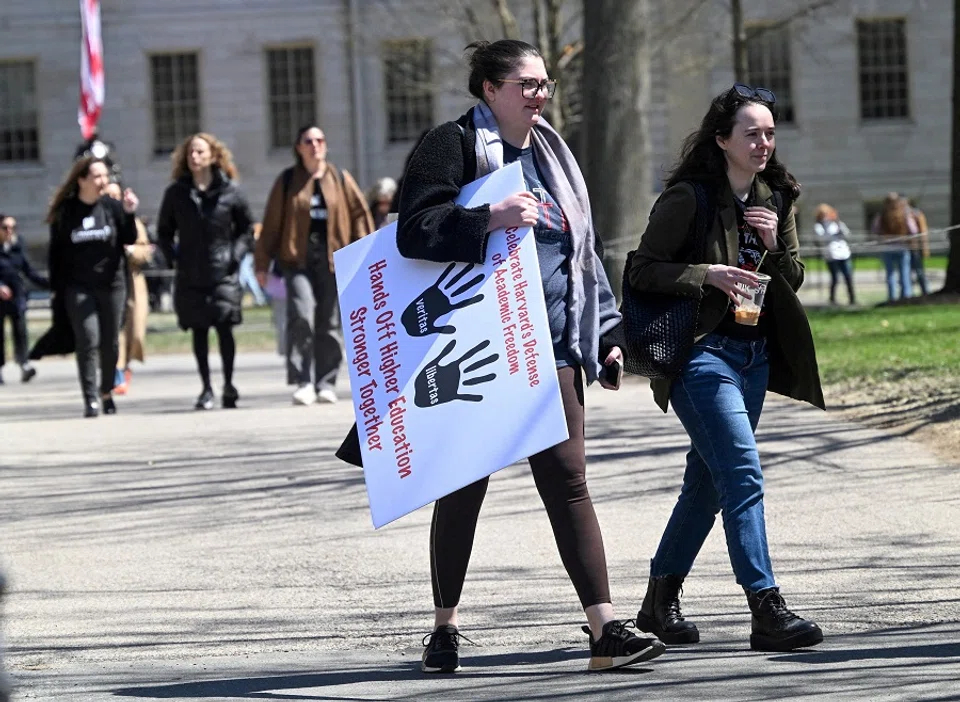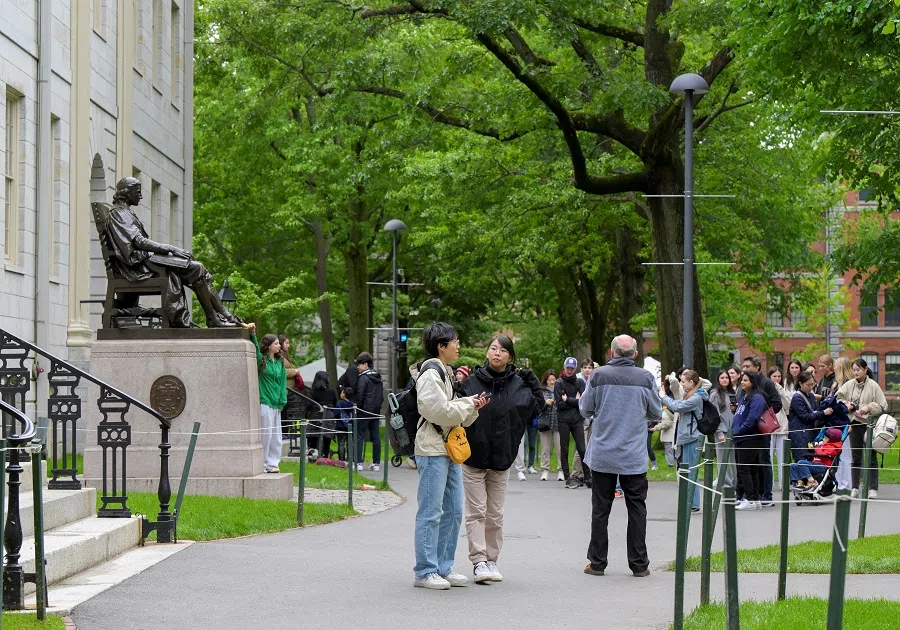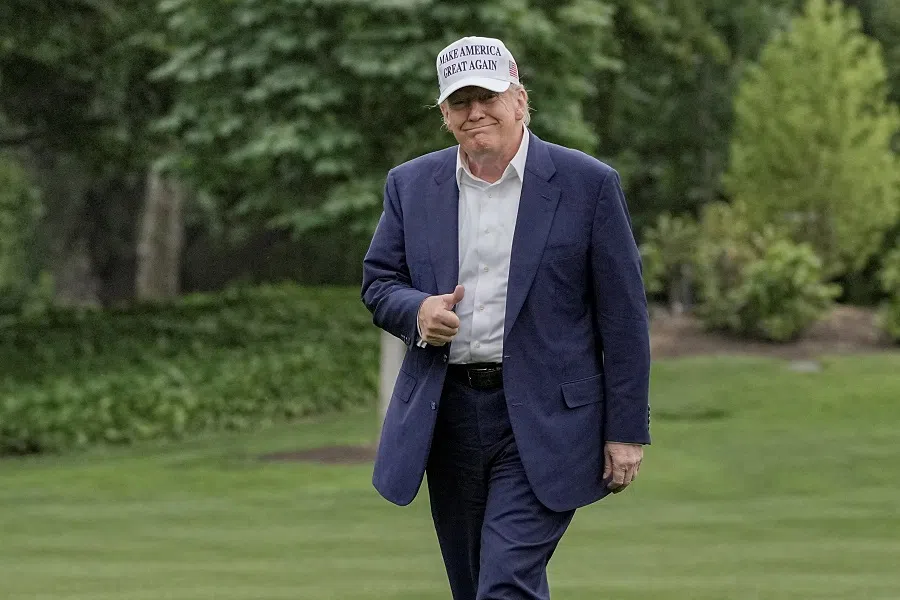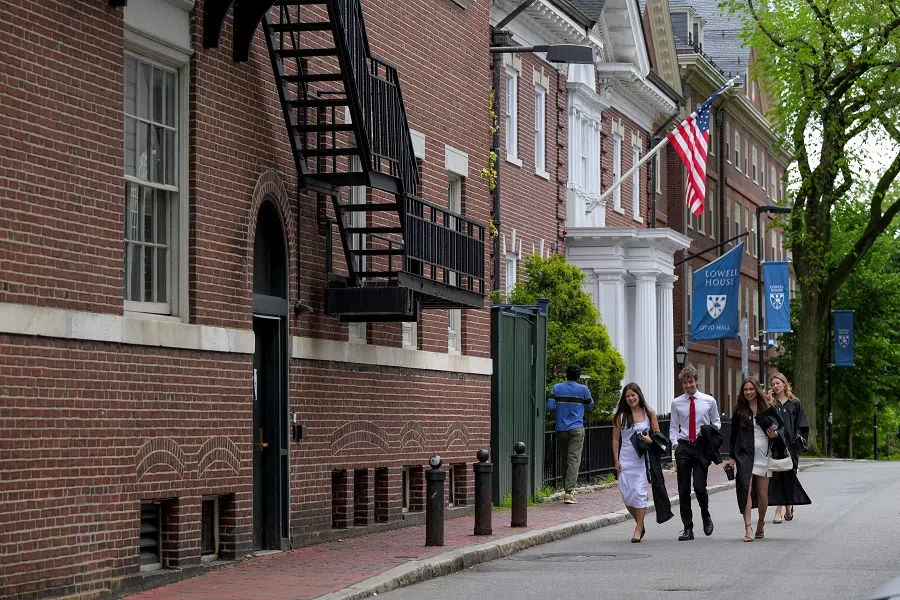Trump’s attack on Harvard could benefit China
As Harvard refuses to bow down to US President Donald Trump, the Trump administration is ratcheting up its pressure on the Ivy League institution. Lianhe Zaobao correspondent Yu Zeyuan notes that all this is probably going to benefit China instead.

The Trump administration recently took strong action against the elite Harvard University, not only freezing US$2.2 billion in grants and threatening to rescind the college’s tax-exempt status in April but even announcing the revocation of the university’s certification to enrol international students last week, forcing existing students to transfer schools or lose their legal status in the US.
On 22 May, the US Department of Homeland Security said that it is holding Harvard University accountable for allegedly coordinating with the Chinese Communist Party (CCP) and fostering violence, anti-Semitism and support for terrorism on its campus. Due to the college’s failure to adhere to the law, it has lost its Student and Exchange Visitor Program (SEVP) certification. It also asserted that Harvard had plenty of opportunity to do the right thing, but it refused.
Far-fetched claims
The accusation of Harvard University coordinating with the CCP is somewhat perplexing. Citing a White House official on 23 May, Reuters reported that Harvard has long been exploited by the CCP and turned a blind eye to vigilante CCP-directed harassment on campus. The House of Representatives’ Select Committee on China had also previously accused Harvard of providing training to Xinjiang Production and Construction Corps (XPCC) officials, with the engagements continuing to 2024. Yet, the XPCC had already been sanctioned by the US government early in 2020 for its role in alleged human rights abuses.
In fact, since the mid-1990s, Harvard University has trained nearly a thousand Chinese officials at the director level or higher through short-term programmes. Some of these individuals later rose to provincial or ministerial-level positions. Among them are Li Yuanchao, former member of the Politburo and vice-president of China; Liu He, former member of the Politburo and vice-premier; Chen Deming, former minister of commerce; and Xie Fuzhan, former party secretary of Henan.
Several officials who had fallen from grace, such as Zhao Zhengyong, former party secretary of Shaanxi; Qiu He, former deputy party secretary of Yunnan; and Yang Weize, former member of the Standing Committee of the Jiangsu Provincial Party Committee and party secretary of Nanjing, also participated in short-term training programmes at Harvard University.
By taking action against Harvard, Trump aims to solidify his anti-elite, anti-liberal political image and consolidate support among his base of relatively conservative, white working-class voters.

However, characterising Harvard’s longstanding training of Chinese officials as being “exploited” by the CCP seems far-fetched, because Harvard’s training of Chinese officials was a consensus formed between China and the US. The Chinese side aimed to broaden its officials’ global perspectives and learn advanced management practices through the training, while the US sought to enhance Chinese officials’ understanding of America and cultivate a pro-US faction within China. From this perspective, Harvard’s training of Chinese officials was, at the least, mutually beneficial, and arguably even more in line with US interests.
War of values
Now, the aggressive Trump administration’s targeting of Harvard University can be attributed, in part, to the fact that Harvard represents values of diversity, equality, inclusion, liberalism, and intellectual elitism. Individuals who hold these values often constitute the Democratic Party’s base and are at odds with the conservative, populist values espoused by the Trump administration. By taking action against Harvard, Trump aims to solidify his anti-elite, anti-liberal political image and consolidate support among his base of relatively conservative, white working-class voters.
... if this precedent is set, the Trump administration would likely not stop at Harvard and go on to target other schools, which in turn means heightened risks for Chinese students planning to study in the US.
At the same time, following the Israel-Hamas conflict in October 2023, a wave of support for Palestine erupted across American university campuses, with many staff and student organisations at Harvard University participating in related activities. The Trump administration targeted these pro-Palestinian movements in tertiary institutions as part of a strategy to undermine the liberal base of the Democrats, in a bid to help the conservatives gain ground in universities, reclaiming ground in ideological and public discourse.
Under pressure from the Trump administration, schools such as Columbia University among others which have been accused of having “anti-Semitic” tendencies have chosen to compromise. Only Harvard University continues to stand firm against the Trump administration, prompting Trump to step up his measures against Harvard.
Threats against Harvard
Among the measures imposed by the Trump administration, the most critical one is the threat to revoke Harvard’s SEVP certification, which would prevent Harvard from enrolling international students and force current international students to transfer to other schools.

Harvard has approximately 6,800 international students, with most paying high tuition fees and representing a significant source of revenue for the institution. Without international students and visiting scholars, Harvard’s finances, academic research and international influence would all suffer greatly.
There are over 1,000 Chinese students studying at Harvard. If Trump’s measures against Harvard were to be implemented, it would significantly impact both current and prospective Chinese students at Harvard. Furthermore, if this precedent is set, the Trump administration would likely not stop at Harvard and go on to target other schools, which in turn means heightened risks for Chinese students planning to study in the US.
Trump’s actions against Harvard could severely damage the image of intellectual and academic freedom that the US has cultivated over the years, affecting its ability to attract foreign talent, which could benefit countries like China in retaining or drawing talent.
Benefiting China
Yet from a broad perspective, Trump’s crackdown on Harvard might not be entirely disadvantageous for China. Firstly, the US has already restricted the fields of study available to Chinese students, with certain sensitive tech-related programmes off-limits. Secondly, Trump’s actions against Harvard could severely damage the image of intellectual and academic freedom that the US has cultivated over the years, affecting its ability to attract foreign talent, which could benefit countries like China in retaining or drawing talent.
In fact, due to tightened US student visa policies in recent years, the number of Chinese students studying in the US declined from around 370,000 in 2019 to 277,000 in 2024. If Trump succeeds in “browbeating” Harvard, other American universities would likely exercise more caution in admitting Chinese students, further diminishing the efforts and willingness of Chinese students and scholars to pursue opportunities in the US and in turn prompting them to consider other countries, or remain in China.

Some universities in Hong Kong and Macau have already invited Harvard’s international students to enrol, and there were calls from Chinese self-media encouraging local Chinese universities to attract these students — even suggesting that Harvard should establish a campus in China.
For China, Trump’s machinations are perceived as internal strife for the US. Though the Chinese government opposed the notion of linking the crackdown on Harvard with the CCP, public sentiment largely adopts a detached “spectator” attitude, looking on at how Harvard battles the Trump administration. Regardless of who wins, China would not stand to lose.
This article was first published in Lianhe Zaobao as “特朗普打哈佛对中国有利”.





![[Big read] When the Arctic opens, what happens to Singapore?](https://cassette.sphdigital.com.sg/image/thinkchina/da65edebca34645c711c55e83e9877109b3c53847ebb1305573974651df1d13a)